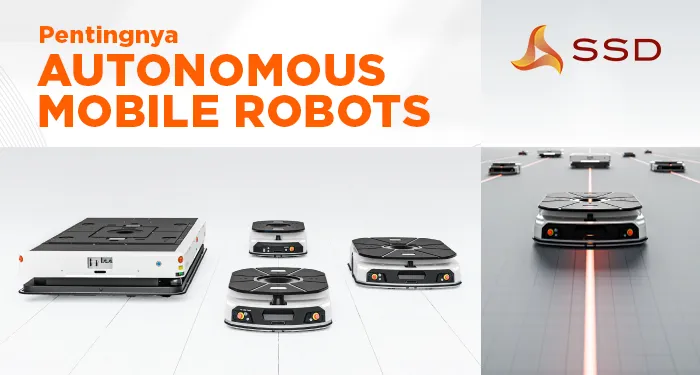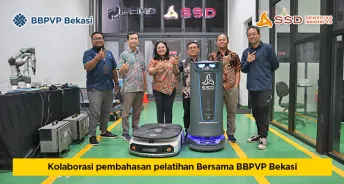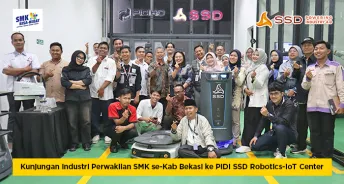Berita

The Importance of Autonomous Mobile Robots (AMRs)
Autonomous Mobile Robots (AMRs) are critical to industry as they bring significant benefits in terms of efficiency, safety and operational flexibility. Here are some of the main reasons why AMR has become very important in the industrial sector:
1. Increase Efficiency and Productivity
• 24/7 Operation: AMRs can work continuously without needing to take a break, allowing industries to maintain 24/7 operations. This is especially useful in sectors that require continuous production.
• Time Savings: They can quickly transport materials or components from one place to another in the factory, reducing the time spent on material transportation.
• Production Process Optimization: With advanced navigation capabilities, AMR can organize the most efficient paths to move across the factory floor, minimizing travel time and reducing congestion in production areas.
2. Reduce operational costs
• Minimal Maintenance: AMRs are typically designed to require little maintenance compared to conventional mechanical equipment, meaning maintenance costs can be reduced.
3. Improve Safety in the Workplace
• Reduces the Risk of Injury: As with performing demanding or dangerous tasks, such as transporting heavy items or working in hazardous environments, AMR helps reduce the risk of injury and improves worker safety.
• Obstacle Detection: Sensor technology and AI embedded in AMRs enable them to detect and avoid obstacles in real-time, reducing the risk of collisions and accidents in industrial environments.
4. High Flexibility and Adaptability
• Reprogramming: AMRs can be reprogrammed to perform a variety of tasks, allowing them to adapt quickly to changing production needs or factory layout changes.
• Integration with Other Systems: AMR can be integrated with warehouse management systems (WMS) and factory management systems (MES), enabling smoother workflow automation and more efficient inventory management.
5. Improved Quality and Consistency
• Reduced Errors: By using AMR for repetitive tasks, the risk of errors can be significantly reduced, ensuring consistency in product quality.
• Delivery Accuracy: AMR can ensure delivery of materials to the right location with high accuracy, thereby reducing errors in the production process or inventory management.
6. Increase the Speed of Decision Making
• Real-Time Data Collection: AMR can be equipped with IoT technology and sensors that collect real-time data about operational conditions, inventory and the factory environment, providing useful insights for decision making.
• Data-Driven Optimization: By analyzing the data collected by AMR, companies can identify bottlenecks in the production process and carry out more precise optimization.
7. Increase Competitiveness in the Market
• Time-to-Market Speed: Greater efficiency means products can be produced and delivered more quickly to market, helping companies stay competitive.
• Increased Production Capacity: By using AMR, industry can increase its production capacity without the need for large investments in physical expansion, because AMR can adapt well to existing facilities.
With these advantages, AMR has become an integral part of modern industrial automation and digital transformation strategies, helping companies achieve higher efficiency, reduce costs and improve workplace safety.
PIDI SSD Robotics-IoT Center
Delta Commercial Park 1 Blok A No. 6
Jl. Kenari Raya Delta Silicon 6
Lippo Cikarang - Bekasi, 17550, Indonesia
P: (62-21) 8991 1097
F: (62-21) 8991 1098
E: cikarang@suryasarana.com
#SSDAutomation #RoboticsIndonesia #InternetofThings #IoT #Robotic #Robotik #Automation #Otomasi #Industry4 #KemenperinRI #MakingIndonesia4 #PIDI4
1. Increase Efficiency and Productivity
• 24/7 Operation: AMRs can work continuously without needing to take a break, allowing industries to maintain 24/7 operations. This is especially useful in sectors that require continuous production.
• Time Savings: They can quickly transport materials or components from one place to another in the factory, reducing the time spent on material transportation.
• Production Process Optimization: With advanced navigation capabilities, AMR can organize the most efficient paths to move across the factory floor, minimizing travel time and reducing congestion in production areas.
2. Reduce operational costs
• Minimal Maintenance: AMRs are typically designed to require little maintenance compared to conventional mechanical equipment, meaning maintenance costs can be reduced.
3. Improve Safety in the Workplace
• Reduces the Risk of Injury: As with performing demanding or dangerous tasks, such as transporting heavy items or working in hazardous environments, AMR helps reduce the risk of injury and improves worker safety.
• Obstacle Detection: Sensor technology and AI embedded in AMRs enable them to detect and avoid obstacles in real-time, reducing the risk of collisions and accidents in industrial environments.
4. High Flexibility and Adaptability
• Reprogramming: AMRs can be reprogrammed to perform a variety of tasks, allowing them to adapt quickly to changing production needs or factory layout changes.
• Integration with Other Systems: AMR can be integrated with warehouse management systems (WMS) and factory management systems (MES), enabling smoother workflow automation and more efficient inventory management.
5. Improved Quality and Consistency
• Reduced Errors: By using AMR for repetitive tasks, the risk of errors can be significantly reduced, ensuring consistency in product quality.
• Delivery Accuracy: AMR can ensure delivery of materials to the right location with high accuracy, thereby reducing errors in the production process or inventory management.
6. Increase the Speed of Decision Making
• Real-Time Data Collection: AMR can be equipped with IoT technology and sensors that collect real-time data about operational conditions, inventory and the factory environment, providing useful insights for decision making.
• Data-Driven Optimization: By analyzing the data collected by AMR, companies can identify bottlenecks in the production process and carry out more precise optimization.
7. Increase Competitiveness in the Market
• Time-to-Market Speed: Greater efficiency means products can be produced and delivered more quickly to market, helping companies stay competitive.
• Increased Production Capacity: By using AMR, industry can increase its production capacity without the need for large investments in physical expansion, because AMR can adapt well to existing facilities.
With these advantages, AMR has become an integral part of modern industrial automation and digital transformation strategies, helping companies achieve higher efficiency, reduce costs and improve workplace safety.
PIDI SSD Robotics-IoT Center
Delta Commercial Park 1 Blok A No. 6
Jl. Kenari Raya Delta Silicon 6
Lippo Cikarang - Bekasi, 17550, Indonesia
P: (62-21) 8991 1097
F: (62-21) 8991 1098
E: cikarang@suryasarana.com
#SSDAutomation #RoboticsIndonesia #InternetofThings #IoT #Robotic #Robotik #Automation #Otomasi #Industry4 #KemenperinRI #MakingIndonesia4 #PIDI4
Lainnya

Berita
PT. Surya Sarana Dinamika Visits Lantas Disnakertrans West Java for Collaboration on Human Resource Competency DevelopmentKolaborasi Peningkatan Kompetensi

Berita
Collaborative discussion of training with BBPVP BekasiUntuk meningkatkan kompetensi SDM Industri

Berita
Kunjungan Industri Perwakilan SMK se-Kabupaten BekasiTo prepare superior human resources in the Industrial Era 4.0

Berita
Sharing insights and experiences in the industry with SMK Negeri 1 Kabupaten TangerangIndustrial visit



